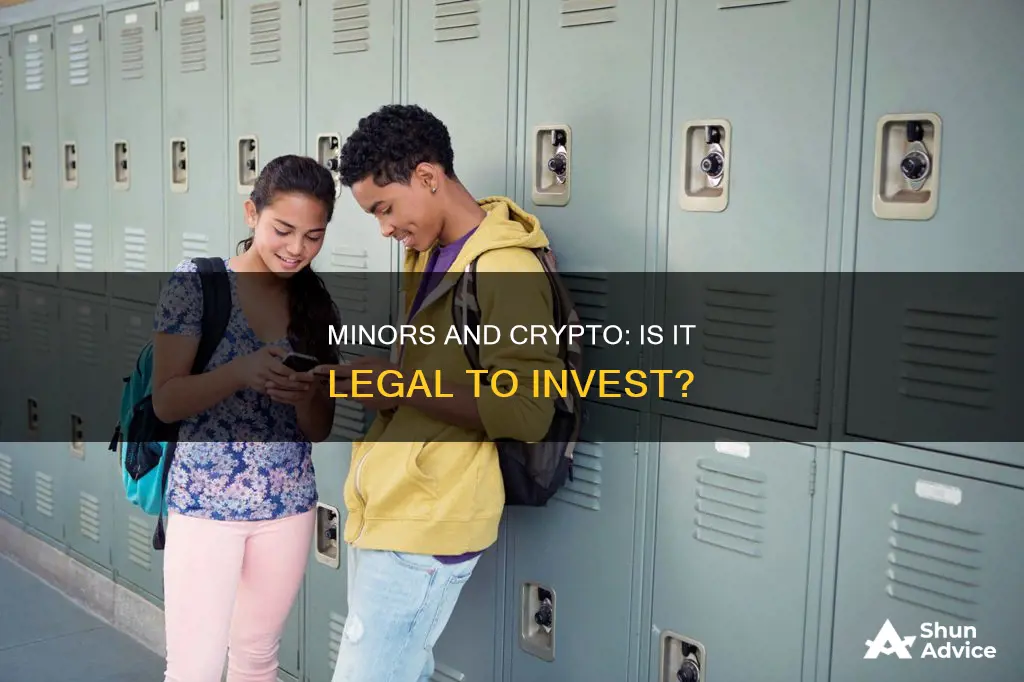
Investing in cryptocurrencies is risky and highly volatile, but many young people are interested in investing in crypto as they see it as the future of finance. While there are no laws preventing minors from investing in cryptocurrencies, many crypto exchanges require users to be at least 18 years old. So, how can minors invest in crypto? One way is through a custodial account, where an adult, usually a parent, opens and manages an investment account on behalf of the minor. The assets are legally owned by the child, but the adult retains control of the account until the child reaches legal adulthood. Another option is for an adult to buy crypto and gift it to the minor. This can be done by using their own crypto exchange account or by transferring the crypto to a hardware wallet, which can then be given to the minor as a gift.
| Characteristics | Values |
|---|---|
| Legality of minors investing in crypto | In the US, there are no laws forbidding minors from investing in crypto |
| Age requirements of crypto exchanges | All reputable exchanges in the US require users to be at least 18 years old |
| Crypto wallets for minors | There are no age limits for self-controlled crypto wallets, but wallets that are part of a regulated crypto exchange are limited to users who are at least 18 years old |
| Custodial accounts | Adults can set up custodial accounts for minors, where the assets are owned by the child but the account is managed by the adult |
| Crypto as an investment for minors | Crypto is a risky investment for minors due to its volatile nature, but it can provide opportunities for financial literacy and education |
What You'll Learn

Minors can own crypto, but they can't buy it
While there are no laws prohibiting minors from owning or investing in cryptocurrencies, many crypto exchanges require users to be at least 18 years old. This creates a barrier to entry for minors wishing to invest in crypto. However, there are alternative ways for minors to gain exposure to the crypto market.
Minors can own cryptocurrencies and even invest in them, but they typically cannot buy them directly on crypto exchanges due to age restrictions. Popular exchanges like Coinbase, Binance.US, and Paypal require users to be at least 18 years old. These platforms allow individuals to buy, sell, and store cryptocurrencies, but minors are restricted from using their services independently.
So, how can minors invest in cryptocurrencies? One option is for parents or legal guardians to set up a custodial account on behalf of their children. A custodial account is an adult-managed investment account where the assets legally belong to the child, but the account is managed by a parent or guardian. This allows minors to own and invest in cryptocurrencies without directly purchasing them on exchanges. The assets can be held in a crypto wallet, and the child gains full access to the account when they reach legal adulthood.
Another option for minors to gain exposure to the crypto market is through crypto ETFs (Exchange-Traded Funds) or mutual funds. In this case, an adult would open a custodial UGMA or UTMA investment account and purchase crypto ETFs or mutual funds that provide indirect exposure to cryptocurrencies. These funds do not directly own crypto assets but gain exposure through futures contracts. While this option may not align with those interested in the technology behind crypto, it offers a way to include crypto in a minor's portfolio.
Additionally, minors can explore decentralised exchanges, which are currently unregulated and have no age restrictions. However, these exchanges only allow the trading of cryptocurrencies and do not support the conversion of fiat currency (such as US dollars) into crypto. Therefore, minors would need to acquire crypto through other means before utilising these decentralised platforms.
It is important to note that investing in cryptocurrencies carries risks, especially given their volatile nature. Cryptocurrencies are subject to significant price fluctuations, and there are no government or banking institutions regulating them. As such, minors and their parents or guardians should carefully consider these risks and seek financial advice before making any investment decisions.
Institutional Bitcoin Adoption: Who's In and Why?
You may want to see also

Crypto for kids: yes or no?
Technically, yes. While there are no laws prohibiting minors from investing in cryptocurrencies, many crypto exchanges require users to be at least 18 years old. This creates a barrier to entry for minors wishing to invest directly in crypto. However, there are alternative ways for minors to gain exposure to the crypto market, such as through custodial accounts or specialised apps.
The Pros of Crypto for Kids
- Crypto is the future of finance, so it's a good idea for kids to get familiar with it early on.
- Crypto can provide a valuable financial education, teaching kids about risk management, sensible investments, and avoiding financial scams.
- It can give kids a head start in understanding the technology behind crypto and its potential as a transformative asset.
- Compounding interest can turn small investments into large sums over time, and kids have time on their side.
- Crypto can be a more exciting and relatable way for kids to learn about investing than traditional assets.
The Cons of Crypto for Kids
- Crypto is highly volatile and unregulated, making it a risky investment, especially for minors.
- The lack of regulation means there is no safety net if something goes wrong, as no government or banking institutions oversee cryptocurrencies.
- It can be complex for kids to understand, particularly the abstract nature of digital assets that cannot be seen or touched.
- The high risk of scams and hacks in the crypto space means minors could be vulnerable to financial loss or fraud.
- The lack of strict crypto regulations means improper use of blockchain by minors is a concern.
So, Is Crypto a Good Idea for Kids?
While there are arguments for introducing kids to crypto, the high level of risk and complexity involved means it may be more suitable for older teenagers who have a good understanding of financial concepts and the ability to make informed decisions. For younger children, a custodial account managed by a parent or guardian could be a safer way to gain exposure to the crypto market without taking on too much risk. Ultimately, the decision to involve kids in crypto investing should be made with careful consideration of the potential benefits and drawbacks.
EverGrow Coin: A Guide to Investing in the Crypto
You may want to see also

How to invest in crypto for kids
While there are no laws preventing minors from investing in cryptocurrencies, many U.S.-based crypto exchanges require users to be at least 18 years old. This means that, in most cases, a child will need their parent or guardian to set up an account and buy crypto on their behalf.
- Custodial account via a crypto exchange or app: The simplest way for adults to buy crypto for children is to use a crypto exchange or app that allows them to set up custodial investment accounts and crypto wallets on behalf of children. Examples include EarlyBird and UNest. These platforms allow you to buy and hold cryptocurrencies such as Bitcoin and Ethereum. When the child becomes a legal adult, they gain full access to the account.
- Cryptocurrency ETFs or mutual funds: An adult can open a custodial UGMA or UTMA investment account via a stockbroker and assign the child as the beneficiary. The adult can then buy a cryptocurrency ETF or mutual fund. Most of these funds do not directly own cryptocurrency but gain exposure to crypto assets through futures contracts.
- Cryptocurrency exchange and crypto wallet: An adult can use their own crypto exchange account to buy and hold cryptocurrency and later sell the assets or gift the crypto and/or the physical hardware wallet containing the assets to the child once they become a legal adult.
Crypto investing is high-risk and mostly unregulated. It is considered a speculative investment, and investors can lose most or all of their money. Crypto is also extremely volatile, with its value fluctuating wildly over time. There is also regulatory uncertainty around crypto, and the risk that some governments will restrict its use or ban it outright. Additionally, while crypto itself is secured through encryption, scams and hacks have cost investors billions of dollars.
IRS and Crypto: What You Need to Know
You may want to see also

Crypto custodial accounts
There are several ways to set up a crypto custodial account. One option is to use an investment app such as EarlyBird, which allows adults to set up custodial investment accounts and crypto wallets on behalf of children. Any legal adult can start an EarlyBird account, and multiple adults can contribute funds. The money in the account can be used for any purpose once the child becomes a legal adult. EarlyBird also offers the option to invest in assets other than cryptocurrencies, such as stocks, ETFs, and bonds.
Another option is to set up a custodial UGMA or UTMA investment account via a stockbroker and purchase cryptocurrency ETFs or mutual funds. In this case, the adult would need to assign the child as the beneficiary, and the account would transfer to the child's control once they become a legal adult. It is important to note that most crypto ETFs do not directly own cryptocurrency but gain exposure through futures contracts. These funds tend to have high expense ratios, which can reduce long-term performance.
A third option is to use a cryptocurrency exchange to buy crypto directly and then transfer it to a hardware wallet, which can be gifted to the child. This method is more advanced and requires the child to keep the physical wallet safe and remember their secret seed phrase (passcode).
It is worth noting that while there are no laws forbidding minors from investing in cryptocurrencies, many U.S.-based crypto exchanges require users to be at least 18 years old. Therefore, a custodial account is a suitable option for minors who want to invest in cryptocurrencies.
Feathercoin Investment: Worthwhile or Worthless?
You may want to see also

Crypto wallets for minors
Minors are increasingly interested in cryptocurrencies, driven by the promise of high returns and stories of young crypto millionaires. While there is no minimum age to use cryptocurrency, most regulated crypto apps and exchanges require users to be at least 18 years old. However, there are alternative ways for minors to get involved in the crypto world.
Crypto Wallets and the Law
In the United States and many other countries, the minimum age to engage in cryptocurrency transactions through well-known exchanges is 18, as mandated by the American Securities and Exchange Commission (SEC). However, this doesn't completely block access to those under 18. There are legal loopholes and alternative routes that minors can use to enter this digital financial space.
- Custodial accounts: These are accounts opened and managed by adults on behalf of minors. The assets legally belong to the minor, but the adult has control over the account until the minor reaches the age of majority, usually 18 or 21. Examples include UGMA and UTMA accounts.
- Decentralized exchanges: Crypto exchanges that are decentralised don't require users to be a certain age. However, these exchanges are highly risky and don't allow the exchange of fiat currency (such as US dollars) for crypto.
- Hardware wallets: Adults can buy crypto and then transfer it to a hardware wallet, which they can then give to the minor as a gift. This method requires the minor to keep the physical wallet safe and remember their secret seed phrase.
- Software wallets: There are software wallets like Exodus, MyEtherWallet, and MetaMask that minors can use with parental consent or supervision.
Tips for Parents
If you're a parent considering helping your minor child enter the world of crypto, here are some tips:
- Educational resources: Use educational platforms to teach your child the basics of blockchain and crypto.
- Parental oversight: Monitor your child's trading activities and set boundaries.
- Time constraints: Limit their screen time on trading platforms to avoid overexposure and maintain a healthy relationship with the technology.
- Financial caps: Set spending limits and make sure your child understands the risks and potential losses.
- Risk assessment: Teach them to weigh the pros and cons before making any trades.
- Profit and loss journals: Encourage them to keep a record of their trades, wins, and losses as a learning tool.
Ratcoin Investment Guide: Strategies for Beginners
You may want to see also
Frequently asked questions
There is no law prohibiting minors from investing in cryptocurrencies, but many U.S.-based crypto exchanges require users to be at least 18 years old.
Minors can invest in crypto via a custodial account, which is an adult-managed investment account that allows a parent or guardian to open an account on behalf of a child. The assets legally belong to the child, but the account is managed by the parent or guardian.
Cryptocurrencies are pushing the envelope of technology and investment, and they can provide a good opportunity for financial literacy. Crypto is also considered the wave of the future and a more suitable medium of exchange for younger generations.
Crypto investing is high-risk and mostly unregulated. Cryptocurrencies are highly volatile and there is a chance of losing some or all of the investment. There is also a risk of fraud and hacks.







